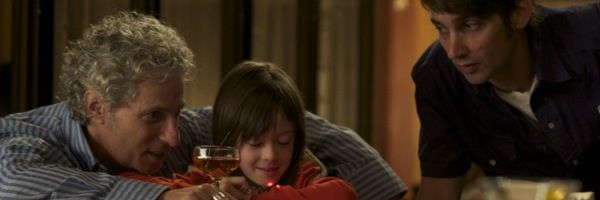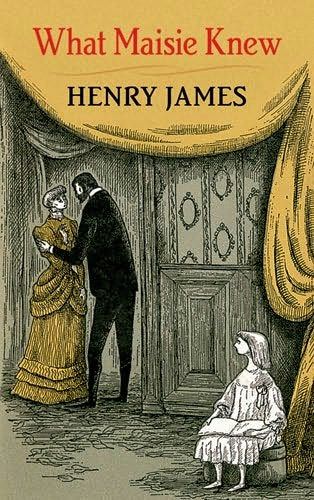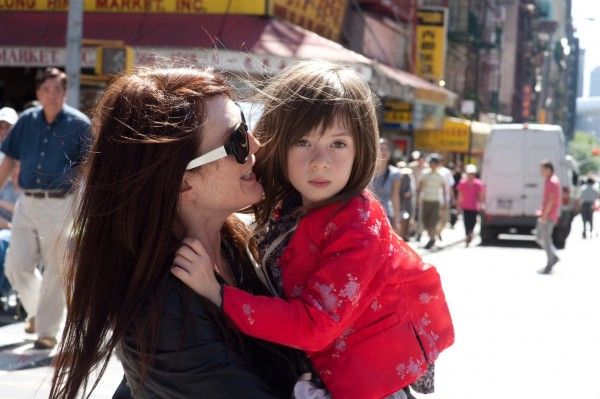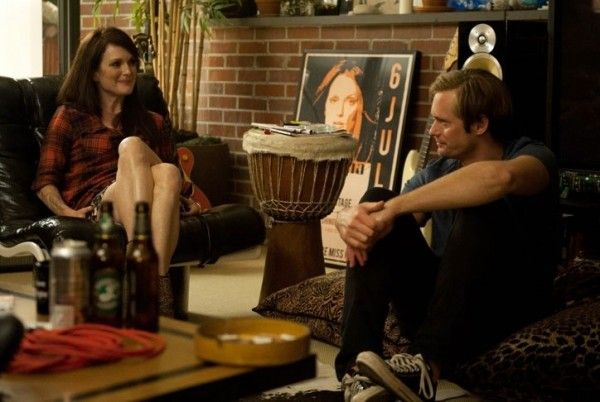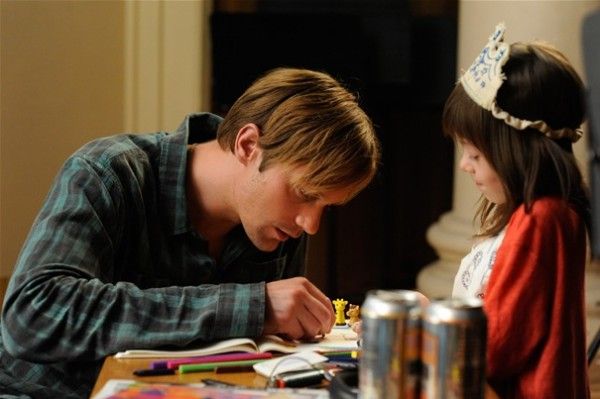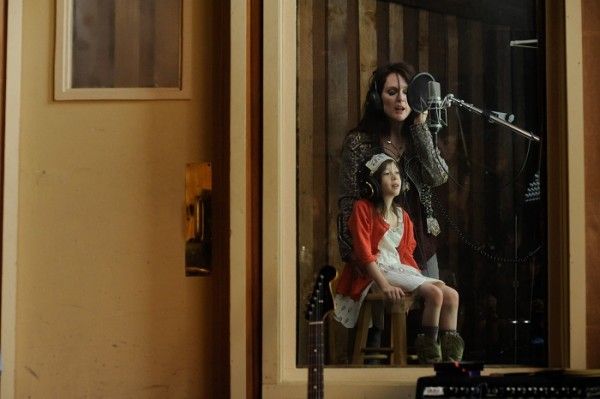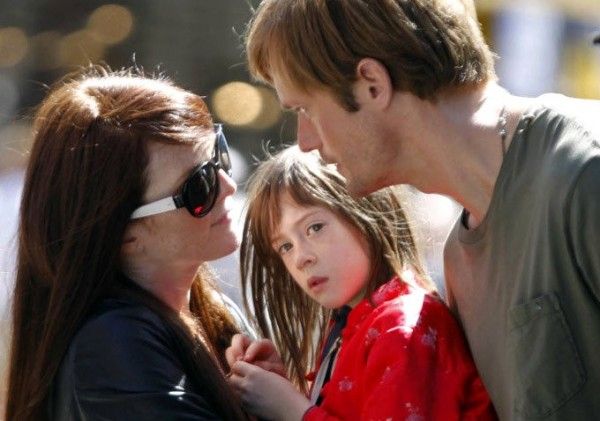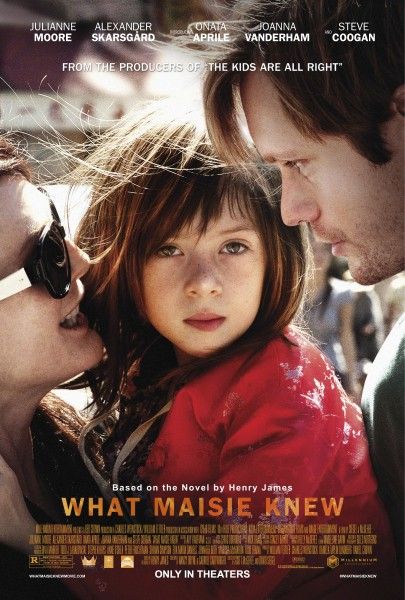What Maisie Knew is a captivating story told through the eyes of the film’s charming 6-year-old heroine (Onata Aprile) who struggles for grace in the midst of her parents’ bitter custody battle. Maisie navigates the increasing turmoil with an unusual generosity of spirit as she comes to realize that she can’t depend on the adults in her life. Directed by Scott McGehee and David Siegel from a screenplay by Carroll Cartwright and Nancy Doyne, the film is set in New York and also stars Steve Coogan, Julianne Moore, Alexander Skarsgard, and Joanna Vanderham.
At the recent press day, Aprile, McGehee and Siegel talked about their modern take on the Henry James novel, how they were drawn to the emotional tenor of the story and its relevancy today, why Aprile’s unique ability made it possible to tell a simple yet complex story from a child’s perspective, how Coogan and Moore became involved in the project, and how visual style and music helped maintain the lightness of touch and innocence of Maisie’s point of view. McGehee and Siegel also discussed the challenge of getting their films financed and produced and revealed the two biopics they’re currently working on. Hit the jump to read more.
Question: Onata, you’re the center of attention with your very own movie. How fun is that and how was it working with these guys?
Onata Aprile: It was really fun.
David Siegel: Was I nicer or was Scott nicer?
Aprile: I don’t know.
That’s a very diplomatic answer. What did you enjoy most about being a part of this film?
Aprile: I liked working with everybody.
What was your favorite scene to shoot?
Aprile: My favorite scene was when we were at the beach house and we were playing Monopoly. And also, when we were at Chinatown and we had the turtle.
The turtle is in both of those scenes. I see a pattern. Who was your favorite co-star? The turtle?
Aprile: (smiles) I don’t know.
How old were you when you first started this project?
Aprile: I think I was six. I’m seven now.
Scott McGehee: She’s a veteran.
Did you understand the complex situation this little girl was in?
Aprile: Yes.
What do you think would happen to a little girl like that in real life?
Siegel: In a way, that was the real life of Maisie, for this particular little girl in this particular moment in her life. That’s how we talked with Onata about the part. Her great talent as an actress is that she has the ability to understand and listen to the scenario and what the story is, and then she can pretend and live that. There was a real truth and reality to our Maisie for Onata.
How did you find Onata for this role?
McGehee: We worked with a casting director in New York, Avy Kaufman. Avy saw hundreds and hundreds of girls. He showed us maybe a hundred girls.
Siegel: We searched like mad people.
McGehee: David and I, on our own, were visiting elementary schools where our friends were teachers. We were concerned about finding the right girl. We didn’t find her until about three weeks before we were supposed to start shooting. Onata was there all along. She’s a student at PS3 in New York, but she didn’t bother to come in and audition for quite some time. Once we saw her, we let out a sigh of relief.
What inspired this story?
Siegel: This is based on a novel written more than a hundred years ago by Henry James also called What Maisie Knew.
McGehee: The other half of that is there are two writers, Carroll Cartwright and Nancy Doyne. It was Carroll’s real life experience that he was exploring and using the Henry James novel as a lens through which he could think about his own life, his own marriage that had gone badly, and a divorce that had been rough, and raising a young girl some time ago.
How did you find the Henry James source material? When did you read it and why did you figure you could adapt it to modern day life?
McGehee: We didn’t read the book until after we’d read the screenplay. The screenplay was adapted by Nancy and Carroll. They started work on it 18 years ago. We didn’t read the screenplay until two or three years ago, and we hadn’t been familiar with the book before reading the screenplay, so our entry into Henry James was this is the source material for the screenplay we’d already read and liked. For us, that was interesting. We had already encountered the modern story version that was going to become the movie, and we’d seen that it worked. We’d seen that the character relationships made sense. We’d seen that the context made sense for a modern day New York. So then, to go back and encounter the Henry James novel written over a hundred years ago with many of the same character relationships at play and the same kind of emotional stakes for a little girl, it was a surprise to us how much of it had been translated over successfully.
I love the fact that you do this film from Maisie’s point of view. Can you talk a little about your decision to shoot it that way?
Siegel: What drew Scott and I in as filmmakers was the challenge and the excitement of trying to tell a story from a child’s perspective because you don’t get those opportunities that often. There are a couple of notable examples. Maybe the most famous is The 400 Blows, the Truffaut film. As much as we did in terms of where the camera was, all the ways we played with the formal aspects of filmmaking, what goes in and out of frame, what she hears and what she doesn’t hear, it really works because of Onata’s ability, especially in close-up, to communicate a thought or to communicate feelings without actually speaking dialogue. That’s one of the things that we got excited about when we met Onata for the first time.
What attracted you to the script?
Siegel: It was this idea of trying to tell a story from a child’s perspective. Maybe I should say that was secondary in terms of the catalyst, because the first thing was we felt it was an emotionally relevant story. That’s always the first thing that we look at when we’re looking at material to adapt ourselves or when scripts come to us. We were both really touched by the emotional tenor of the story and felt like it was really relevant. And then, once we started looking at the James material, we thought it was especially interesting because that book is more than a hundred years old and still the relevancy was there. We read anecdotally that James’ inspiration for writing the book came from hearing of a case where the custody of a child was going to be shared by the parents in a divorce situation, and he had never heard of such a thing. This is in 1890 or so. He thought it was absurd, ridiculous and deleterious to the child’s well-being. The book is more darkly satiric in a way than the movie is. But here, in 2013, it’s the most common thing in the world to share custody, and yet, as I was saying, the relevancy in terms of the push and pull on the child is still pretty heightened.
Can you talk about developing the visual aesthetic for the film and also how music was used to support the story?
Siegel: This is the third film we’ve made with Giles Nuttgens, our DP. Kelly McGehee, Scott’s sister, has been working with us as a designer since we were making short films. This is the second film we’ve made with Stacey Battat, the costumer. We made Uncertainty with her. All of our conversations with the keys on the movie centered around the idea of trying to maintain the lightness of touch and the spirit of this unusual child -- the quality of light that Giles would be doing, the costuming that Stacey would be designing, and the kind of world that Kelly would be creating in terms of both the props that Maisie would have in her hands as well as the world and the rooms that she would occupy. That was our touchstone. It was always Maisie. That was the case when we were thinking about the script. That was the case when we were shooting. And that was especially the case when we were cutting, because the plot point to point story is the story of the adults, but that really isn’t the story of the movie. The story of the movie, from our perspective at least, is the experience of the child and how she’s coming along. From a formal standpoint, it was like going back to film school in a way, because you got to play with the real fundamental building blocks of filmmaking. It’s a simple story, but in a way it’s very complex, because it’s told elliptically through these vignettes. That was a creatively rewarding experience for us.
McGehee: I was just going to add that we were very concerned from the first time we heard about this story. We didn’t want it to become a heavy, weighted down, maudlin story about a family in crisis and the sadness of divorce. Keeping the innocence of Maisie’s point of view was a way for us to keep the atmosphere from becoming crushing. In terms of light and color and the locations we chose, all of that was with an eye to keeping it from getting weighed down by the potential heaviness of the subject matter, and that carried on through the music.
Siegel: It carried on really critically with the music.
McGehee: Nick Urata delivered a score we’re really happy with. We talked a lot in terms of the music, that it’s a movie about a musician and a musician’s family, and there’s music in the house, but that was Susanna’s (Julianne Moore) sound. It was the rock and roll sound. Maisie would have grown up with that. She would have a kind of rock vocabulary but maybe filtered through a different perspective, and that was a touchstone for Nick’s score, to use rock language but in a more childlike way.
Siegel: So that it would be her voice and so that the score would be the voice of the child. I don’t think we meant to say that we were shy of the sadness of it. We were shy of it being maudlin, like it being weighed down in a way by the florid melodrama in a sense. That’s the kind of thing that we didn’t want to have. As tense or sad as it might be, there’s a child’s perspective at play that we didn’t want to lose. That’s where we were coming from.
We walk away hoping she’ll be okay, but we don’t know for sure. Did you consider adding a scene at the end to let us know she’s going to be alright?
McGehee: We considered the ending a lot, of course. One always does. What you’re leaving your audience with is really important to filmmakers, but our ending was very deliberate. This is a little girl. We’ve just seen her make a very strong choice. We’ve seen her stand up for herself and do something for the first time and now we’re watching her on her way. We want to leave the movie with her on her way. We stop. She’s in motion. She’s moving toward a goal that she set for herself, and we end the story there. For us, that felt right. We didn’t want to see her arrive somewhere. We didn’t want to make it nicer or darker than it deserved to be. It was just that. It was moving forward and hoping for the best for her.
This film raises legal questions with two parents who don’t want the child and the two unrelated parties who end up with her. How do you deal with the legal guardianship issue?
Siegel: We like to say that Maisie is the still center of the film, but in terms of the legal questions, we tried to be thorough about it. There’s never a moment where we think there would be a legal confrontation because the court appoints joint custody. She starts going back and forth between the parents, and then each of those parents leaves the child with the other parent thinking that the other parent would take care of her. Again, there’s no legal framework that going to say Susanna can’t for a while leave her child with Margo (Joanna Vanderham) and Lincoln (Alexander Skarsgard). We always thought that there wasn’t a bulwark to anything that was going on. Her legal guardians are still her biological parents.
One of the things I thought was interesting was the way you shot the film. We’re seeing Maisie’s world, but no one explains anything to her. Can you talk a little bit about the place of the parents as a voice in her life?
McGehee: The script was our guide for that, and Henry James was the guide for the screenwriters. You’re looking at these vignettes, these scenes, and it’s really what Maisie’s view is. We liked that idea that people come and go in her life, and we don’t actually see where they’re going to or where they’ve come from, and they don’t tell us when they’re going to be back or when they’re going to leave again. Things enter and leave the frame in a way that she’s pretty much a passive observer of these comings and goings, and that’s her center.
Did that back and forth dynamic and the fluidity of people moving in and out of her life affect you emotionally in any way as filmmakers or as parents?
Siegel: That’s an interesting question. No one has ever asked us that before. I bet it did. I don’t think we were conscious of it, but I bet it did because of the ping-ponging nature of it. The process of shooting a movie is so incremental. So that idea of going back and forth between Beale’s (Steve Coogan) world and Susanna’s world, I bet it did have some degree of an effect on us, but I’m not exactly sure what it was. I would say Onata was the emotional driver of the set in a way, because she was always so happy to be there and was enjoying herself so much. You can’t tell because she’s a little bit nervous right now, but her natural way is more like playing on the High Line with Lincoln or being at the beach, like she was saying, with Margo. We had little six-year-old Onata running around the set and that made people happy.
That was a stroke of genius to cast Steve Coogan. How did you get him in your movie?
McGehee: Thank you very much for noticing how good Steve is. We adore him and we’re gigantic fans of his. When we read the script, both of us were like, “Steve Coogan is perfect for this. We’ve got to get Steve Coogan.” It was actually a bit of a conversation with the producers to bring them around to that idea, but they came around and they liked it, too. Part of what we wanted him for was he’s such a strong actor, but he’s also really good at being a jerk and still being a little bit likeable. No matter how bad he is, no matter what awful things he does and says, somehow there’s something sympathetic about him.
iegel: Or tangibly human.
McGehee: Maybe human is a better word. We thought again in the conversation we’ve been having about keeping the movie from going into a hole of sadness, like there’s something funny about him that we thought would be a helpful note to add to the stew.
Why were the producers reluctant to go along with the idea?
McGehee: He wasn’t at the top of their list. Their job was to finance the picture, and there are other English actors who help them do their job more easily than Steve Coogan.
Julianne Moore also turns in a strong performance and she’s a convincing musician. How did she become involved?
Siegel: Julianne had read the script shortly before we did and had expressed interest, so that was our first job, to make sure that we were all on board doing this together. That was very interesting to us. We were very excited about that. We thought she’d be spot on right for the role. She was a little hesitant about singing at first. She was unconfident about her voice. We hooked her up with Pete Nashel who wrote the scores for several of our films, and he brought a lot of confidence to bear with her. We loved what she did with it. She’s a fearless actress, and Steve as well, biting off the unlikeability of their characters. I was confident that they were going to be able to bring again whatever degree of humanity needed to be there where we just didn’t feel like it wasn’t believable. We enjoyed working with both of them very much.
How difficult is it for you guys to get your films made even though both of you have a great body of work? Do you feel like you’re swimming upstream at all?
Siegel: Can you tread water upstream?
McGehee: (laughs) That’s a very strong current in our business, isn’t it?
What are the main challenges of getting your films financed and produced? What’s it like getting personal, character-driven, auteurish work out there?
Siegel: It’s hard. It’s really hard these days. I don’t want to complain about it, but it is just hard. This is a movie with three notable actors in it and a very small budget, and it wasn’t easy to finance.
McGehee: Casting is always the key to it and we came to this project with Julianne Moore already interested. She’d read the script, and that was a big attraction for us, an actress who seems perfect for the role, has already read it, and expressed interest. That’s a big leg up in trying to get it to come together.
Siegel: We often say we haven’t made many more movies than we’ve made because there were many projects that we spent many years on that get very close and wind up not happening.
What are you working on next?
Siegel: We’re working on a couple of biopics oddly. We’ve never worked from a real person’s life before and that’s been really fun.
What are they about?
Siegel: It’s a little premature to talk about them. They’re slightly fictionalized but based on real people.
What was the most rewarding aspect of making this film?
McGehee: I hope this doesn’t sound too easy, but I think it was working with Onata. With every film, something comes to the fore as a really memorable, lovely experience. We made a film called The Deep End and had a lovely relationship with Tilda Swinson, and then we got to work in Lake Tahoe which was a rewarding physical location. Both of us look back on our set experience [for What Maisie Knew] which was a wonderful creative experience, and it really was Onata at the center of that because it excited everyone to come to work every day.
One of the great scenes in the film is the creation of Maisie’s bedroom. Did Onata help put things into the design of that room?
Aprile: No.
What did your friends say when they found out you were making a movie?
Aprile: They didn’t know.
Will they be seeing the film or maybe a scene from it that you’re in?
Siegel: They’re not old enough yet. (laughs) They might have to wait a year or two.
Did you end up with a favorite toy that you got to play with?
Aprile: No.
McGehee: The turtle.
Siegel: The turtle still lives with Onata.
I think that’s the best gift of all to get out of a movie.
McGehee: Why don’t you tell them what you called the turtle?
Aprile: Tallulah.

